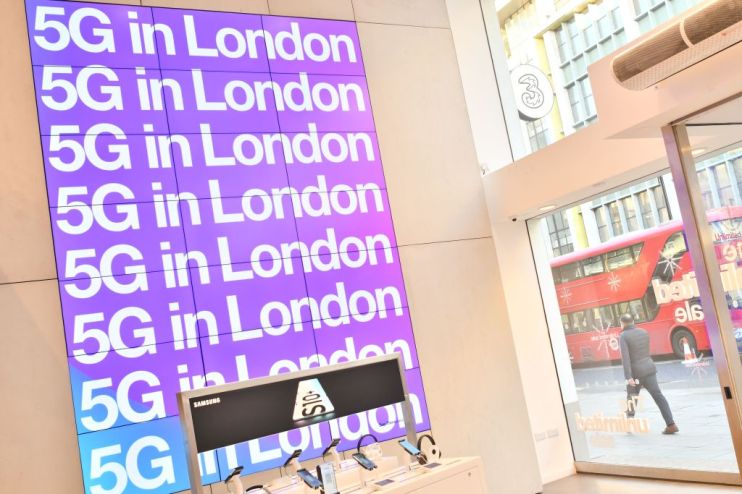Huawei gets government’s go ahead for limited involvement in UK 5G

Chinese tech firm Huawei has been given the go-ahead for limited involvement in the UK’s 5G infrastructure, the government has confirmed.
The full details of the decision, which was agreed at a meeting of the National Security Council this morning, are expected to be laid out by culture secretary Baroness Nicky Morgan in the House of Lords this afternoon.
Today the government confirmed Huawei will be designated a “high risk vendor”. As such it will be blocked from that core part of the system, while a 35 per cent cap would apply to its work in “non-sensitive parts of the network”, at the lower end of what had been expected by analysts.
The government will exclude Huawei from “sensitive geographic locations, such as nuclear sites and military bases,” the culture department said today.
Yesterday the Prime Minister pledged a decision that would enable “progress” for the UK.
‘UK-specific solution’
Today Morgan said: “We want world-class connectivity as soon as possible, but this must not be at the expense of our national security. High risk vendors have never been and never will be in our most sensitive networks.
“The government has reviewed the supply chain for telecoms networks and concluded today it is necessary to have tight restrictions on the presence of high risk vendors.
“This is a UK-specific solution for UK-specific reasons and the decision deals with the challenges we face right now. It not only paves the way for secure and resilient networks, with our sovereignty over data protected, but it also builds on our strategy to develop a diversity of suppliers. We can now move forward and seize the huge opportunities of 21st century suppliers.”
The tech giant’s involvement in the network has been hugely controversial already, with Downing Street enduring heavy lobbying from the US over fears it could compromise the UK’s security.
All eyes on Five Eyes
Washington has threatened to eject the country from the multilateral Five Eyes agreement if Number 10 goes ahead with the decision. But industry sources have told City A.M. this heavy-handed approach was going down badly in Whitehall.
So far, US President Donald Trump has not responded.
Huawei’s vice president Victor Zhang praised the UK government for making an “evidence-based decision”.
“It gives the UK access to world-leading technology and ensures a competitive market,” he added. “We have supplied cutting-edge technology to telecoms operators in the UK for more than 15 years. We will build on this strong track record, supporting our customers as they invest in their 5G networks, boosting economic growth and helping the UK continue to compete globally.”
“We agree a diverse vendor market and fair competition are essential for network reliability and innovation, as well as ensuring consumers have access to the best possible technology.”
Rumbles on the backbenches
Yesterday afternoon, backbencher after backbencher stood up to raise concerns about Huawei’s involvement, with former foreign affairs select committee chairman Tom Tugendhat warning it could “nest a dragon” within the UK’s telecoms infrastructure.
Allowing Huawei to play a role in 5G would amount to letting “the fox into the henhouse”, he added.
Former party leader Iain Duncan Smith, who chaired Johnson’s leadership campaign during the summer, said: “That we should think about giving a company which is heavily subsidised by China, a country that has set out to steal data non-stop, and also technology, that we think of giving to them that right to be in what is essentially a very, very delicate area of our technology, the idea that we would do that seems to me utterly bizarre.
“I was led to believe that this government would not make that decision.”
Huawei all the fuss?
The shift from 4G to 5G is more than a simple upgrade. Advocates believe it will mark a revolutionary change thanks to massive Machine Type Communications (mMTC) and Ultra-Reliable and Low Latency Communications (URLLC). That means a new Internet of Things called the “tactile internet” , which will lead to increasingly sophisticated technology such as robotics and AI in pretty much every part of our lives.
Huawei is where things get awkward. The Chinese firm has received state support in the past, and Washington believes it can be compelled to incorporate software backdoors or hardware as spy tools for Beijing. Huawei has insisted there has never been any such demands made, nor that it would acquiesce if there were.
But the UK is the only member of the Five Eyes alliance – which includes Australia, Canada, New Zealand and the US – to allow the company to participate in the rollout of the new technology. Whitehall sources have stressed that the UK’s “architecture” is totally different to the US’ – hence Morgan’s reference to a “UK-specific” solution.
Critics argue that 5G doesn’t work like other systems, and that once Huawei is ‘in’ there is no way to stop it going wherever it likes. This rubs up against the argument put forward by industry that they can keep the firm out of the core.
But one industry source told City A.M the US position that the system could be hacked from the outer-edges just isn’t credible. “You might as well have someone with an axe take out every cell tower in the country.”